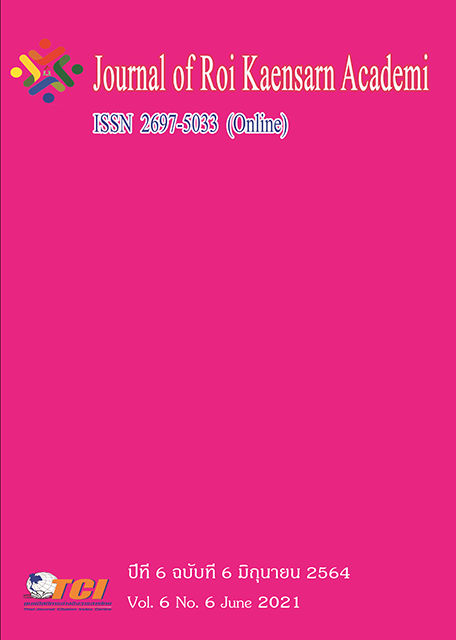การพัฒนาทักษะกระบวนการทางวิทยาศาสตร์ และ ผลสัมฤทธิ์ทางการเรียนโดยการจัดการเรียนรู้แบบปัญหาเป็นฐานของนักเรียนชั้นประถมศึกษาปีที่ 3 -
Main Article Content
บทคัดย่อ
การวิจัยครั้งนี้มีวัตถุประสงค์เพื่อ 1) พัฒนาทักษะกระบวนการทางวิทยาศาสตร์โดยการจัดการเรียนรู้แบบปัญหาเป็นฐาน (Problem-Based Learning : PBL) ของนักเรียนชั้นประถมศึกษาปีที่ 3 ให้นักเรียนมีคะแนนเฉลี่ยตั้งแต่ร้อยละ 70 ของคะแนนเต็ม และมีจำนวนนักเรียนที่ผ่านเกณฑ์ไม่น้อยกว่าร้อยละ 70 ของนักเรียนทั้งหมด 2) เพื่อพัฒนาผลสัมฤทธิ์ทางการเรียนวิทยาศาสตร์ โดยการจัดการเรียนรู้แบบปัญหาเป็นฐาน (Problem-Based Learning : PBL) ของนักเรียนชั้นประถมศึกษาปีที่ 3 ให้นักเรียนมีคะแนนเฉลี่ยตั้งแต่ร้อยละ 70 ของคะแนนเต็ม และมีจำนวนนักเรียนที่ผ่านเกณฑ์ไม่น้อยกว่าร้อยละ 70 ของนักเรียนทั้งหมด 3) เพื่อศึกษาความพึงพอใจของนักเรียนชั้นประถมศึกษาปีที่ 3 ที่มีต่อการจัดการเรียนรู้แบบปัญหาเป็นฐาน (Problem-Based Learning : PBL) เป็นการวิจัยแบบทดลองขั้นต้น (Pre – Experimental Research Design) กลุ่มเป้าหมายเป็นนักเรียนชั้นประถมศึกษาปีที่ 3 จำนวน 14 คน โดยการเลือก แบบเจาะจง (Purposive Sampling) เครื่องมือที่ใช้ในการวิจัย ได้แก่ 1) แผนการจัด การเรียนรู้รายวิชาวิทยาศาสตร์ จำนวน 6 แผน 2) แบบทดสอบวัดทักษะกระบวนการทางวิทยาศาสตร์ จำนวน 20 ข้อ 3) แบบทดสอบวัดผลสัมฤทธิ์ทางการเรียน จำนวน 20 ข้อ 4) แบบวัดความพึงพอใจ และการวิเคราะห์ข้อมูลใช้สถิติการวิจัยใช้พื้นฐาน ได้แก่ ค่าร้อยละ ค่าเฉลี่ย และส่วนเบี่ยงเบนมาตรฐาน
ผลการวิจัยพบว่า
1. พัฒนาทักษะกระบวนการทางวิทยาศาสตร์โดยการจัดการเรียนรู้แบบปัญหาเป็นฐาน (Problem-Based Learning : PBL) ของนักเรียนชั้นประถมศึกษาปีที่ 3 ให้นักเรียนมีคะแนนเฉลี่ยตั้งแต่ร้อยละ 70 ของคะแนนเต็ม และมีจำนวนนักเรียนที่ผ่านเกณฑ์ไม่น้อยกว่าร้อยละ 70 ของนักเรียนทั้งหมด พบว่า ทักษะกระบวนการทางวิทยาศาสตร์ที่เรียนโดยการจัดการเรียนรู้แบบปัญหาเป็นฐาน ของนักเรียนชั้นประถมศึกษาปีที่ 3 มีคะแนนเฉลี่ยร้อยละ 84.23 ของคะแนนเต็ม และมีจำนวนนักเรียนผ่านเกณฑ์ร้อยละ 85.71 ของจำนวนนักเรียนทั้งหมด
2. เพื่อพัฒนาผลสัมฤทธิ์ทางการเรียนวิทยาศาสตร์ โดยการจัดการเรียนรู้แบบปัญหาเป็นฐาน (Problem-Based Learning : PBL) ของนักเรียนชั้นประถมศึกษาปีที่ 3 ให้นักเรียนมีคะแนนเฉลี่ยตั้งแต่ร้อยละ 70 ของคะแนนเต็ม และมีจำนวนนักเรียนที่ผ่านเกณฑ์ไม่น้อยกว่าร้อยละ 70 ของนักเรียนทั้งหมด พบว่า ผลสัมฤทธิ์ทางการเรียนวิทยาศาสตร์โดยการจัดการเรียนรู้แบบปัญหาเป็นฐาน ของนักเรียนชั้นประถมศึกษาปีที่ 3 มีคะแนนเฉลี่ยร้อยละ 80.06 ของคะแนนเต็ม และจำนวนนักเรียนผ่านเกณฑ์ร้อยละ 85.71 ของจำนวนนักเรียนทั้งหมด
3. เพื่อศึกษาความพึงพอใจของนักเรียนชั้นประถมศึกษาปีที่ 3 ที่มีต่อการจัดการเรียนรู้ แบบปัญหาเป็นฐาน (Problem-Based Learning : PBL) พบว่า ความพึงพอใจต่อการจัดการเรียนรู้โดยการจัดการเรียนรู้แบบปัญหาเป็นฐาน ของนักเรียนชั้นประถมศึกษาปีที่ 3 มีคะแนนเฉลี่ยเท่ากับร้อยละ (X = 4.83) เมื่อเทียบกับเกณฑ์แล้วอยู่ในระดับมากที่สุด ค่าเฉลี่ยสูงสุด คือ ด้านสื่อการเรียนรู้ มีคะแนนเฉลี่ยที่ (X = 4.91) คะแนน ด้านครูผู้สอน มีคะแนนเฉลี่ยที่ (X = 4.89) คะแนน ด้านการจัดการเรียนการสอน มีคะแนนเฉลี่ยที่ (X = 4.83) คะแนน ด้านการวัดและประเมินผล มีคะแนนเฉลี่ยที่ (X = 4.81) คะแนน และค่าเฉลี่ยต่ำที่สุด คือ ด้านสภาพแวดล้อมทางการเรียนรู้ มีคะแนนเฉลี่ยที่ (X = 4.74) คะแนน
Article Details
เอกสารอ้างอิง
กระทรวงศึกษาธิการ. (2551). หลักสูตรแกนกลางการศึกษาขั้นพื้นฐานพุทธศักราช 2551. กรุงเทพมหานคร: ชุมนุมสหกรณ์การเกษตรแห่งประเทศไทย.
กระทรวงศึกษาธิการ. (2551). หลักสูตรแกนกลางการศึกษาขั้นพื้นฐานพุทธศักราช 2551. กรุงเทพมหานคร: ชุมนุมสหกรณ์การเกษตรแห่งประเทศไทย.
กุลยา ตันติผลาชีวะ. (2547). การจัดการเรียนรู้สําหรับเด็กปฐมวัย. กรุงเทพมหานคร: เอดิสันเพรสโปรดักส์จำกัด.
จริญญา ปรีชาวิภาษ. (2561). ผลของการจัดการเรียนรู้โดยใช้ปัญหาเป็นฐาน (PBL) เรื่อง โจทย์ปัญหาอัตราส่วน สัดส่วนและร้อยละ ที่มีต่อความสามารถในการแก้ปัญหาทางคณิตศาสตร์ของนักเรียนชั้นมัธยมศึกษาปีที่ 1 โรงเรียนศึกษานารีวิทยา. วิทยานิพนธ์ปริญญาศึกษาศาสตรมหาบัณฑิต สาขาวิชาคณิตศาสตร์ศึกษา. บัณฑิตวิทยาลัย: มหาวิทยาลัยรามคำแหง.
ชุติมา สรรเสริญ. (2560). การพัฒนาความสามารถการเรียนรู้วิชาวิทยาศาสตร์โดยใช้ปัญหาเป็นฐาน (Problem-Based Learning) ของนักเรียนชั้นประถมศึกษาปีที่ 5. วิทยานิพนธ์ปริญญาศึกษาศาสตรมหาบัณฑิต สาขาวิชาหลักสูตรและการสอน. บัณฑิตวิทยาลัย: มหาวิทยาลัยธุรกิจบัณฑิตย์.
ดอกอ้อ รังโคตร. (2553). ผลการจัดกิจกรรมการเรียนรู้วิทยาศาสตร์โดยใช้ปัญหาเป็นฐาน (PBL) เรื่อง ปรากฏการณ์เกี่ยวกับอากาศในชีวิตประจำวัน ชั้นมัธยมศึกษาปีที่ 1. วิทยานิพนธ์ปริญญาการศึกษามหาบัณฑิต สาขาวิชาหลักสูตรและการสอน. บัณฑิตวิทยาลัย: มหาวิทยาลัยมหาสารคาม.
นัจญ์มีย์ สะอะ. (2551). ผลของการเรียนแบบใช้ปัญหาเป็นฐานต่อผลสัมฤทธิ์ทางการเรียนวิทยาศาสตร์ ลักษณะการเรียนรู้ด้วยตนเอง และความพึงพอใจต่อการจัดการเรียนรู้ของนักเรียนชั้นมัธยมศึกษาปีที่ 5. วิทยานิพนธ์ปริญญาศึกษาศาสตรมหาบัณฑิต สาขาวิชาการศึกษาและการสอน. บัณฑิตวิทยาลัย: มหาวิทยาลัยสงขลานครินทร์ วิทยาเขตปัตตานี.
มัณฑรา ธรรมบุศย์. (2545). การพัฒนาคุณภาพการเรียนรู้โดยใช้ PBL (Problem-Based Learning). วารสารวิชาการ. 5 (2), 11-17.
ฟ้ามุ่ย สุกัณศีล. (2548). รายงานการวิจัยความพึงพอใจต่อการให้บริการของสำนักงานเลขานุการคณะสังคมศาสตร์ มหาวิทยาลัยเชียงใหม่. เชียงใหม่: มหาวิทยาลัยเชียงใหม่.
มัสยมาศ ด่านแก้ว. (2557). การศึกษาความสามารถในการแก้ปัญหาและผลสัมฤทธิ์ทางการเรียนของนักเรียนชั้นมัธยมศึกษาปีที่ 2 เรื่อง ระบบร่างกายมนุษย์และสัตว์ โดยใช้การจัดการเรียนรู้แบบใช้ปัญหาเป็นฐาน. วิทยานิพนธ์ศึกษาศาสตรมหาบัณฑิต สาขาวิชาหลักสูตรและการสอน. บัณฑิตวิทยาลัย: มหาวิทยาลัยขอนแก่น.
รุสดา จะปะเกีย. (2558). ผลของการจัดการเรียนรู้แบบปัญหาเป็นฐาน ที่มีผลสัมฤทธิ์ทางการเรียนวิชาชีววิทยาและความพึงพอใจในการจัดการเรียนรู้ ของนักเรียนชั้นมัธยมศึกษาปีที่ 6. วิทยานิพนธ์ปริญญามหาบัณฑิต. บัณฑิตวิทยาลัย: มหาวิทยาลัยสงขลานครินทร์.
สาริญา และสุม. (2560). ผลของการจัดการเรียนรู้โดยใช้ปัญหาเป็นฐาน ที่มีต่อผลสัมฤทธิ์ทางการเรียนวิชาชีววิทยา ทักษะการสื่อสารทางวิทยาศาสตร์และเจตคติต่อวิทยาศาสตร์ของนักเรียนชั้นมัธยมศึกษาปีที่ 6. วิทยานิพนธ์ศึกษาศาสตรมหาบัณฑิต สาขาวิชาหลักสูตรและการสอน. บัณฑิตวิทยาลัย: มหาวิทยาลัยสงขลานครินทร์.
สถาบันส่งเสริมการสอนวิทยาศาสตร์และเทคโนโลยี. (2524). คู่มือการใช้อุปกรณ์วิทยาศาสตร์. กรุงเทพมหานคร: สถาบันส่งเสริมการสอนวิทยาศาสตร์และเทคโนโลยี.
สถาบันส่งเสริมการสอนวิทยาศาสตร์และเทคโนโลยี. (2559). คู่มือการใช้อุปกรณ์วิทยาศาสตร์. กรุงเทพมหานคร: สถาบันส่งเสริมการสอนวิทยาศาสตร์และเทคโนโลยี.
สำนักงานเลขาธิการสภาการศึกษา กระทรวงศึกษาธิการ. (2550). รูปแบบการจัดการเรียนรู้เพื่อพัฒนาความสามารถของเด็กในการอ่าน คิด วิเคราะห์ เขียน และสร้างองค์ความร้ด้วยตนเอง โดยเน้นผู้เรียน เป็นสําคัญ. กรุงเทพมหานคร: สำนักงานเลขาธิการสภาการศึกษา.
Elshafei, D.L. (1998). A comparison of problem-based and traditional learning in algebra II. Online. Retrieved December 2, 2020. From: http://thailis.uni.net.th/dao/detail.nsp
Willkerson, L. & Feletti, G. (1989). Problem-Based Learning : One Approach to Increasing Student Participation. New Directions for Teaching and Learning. 8 (3), 51-60

